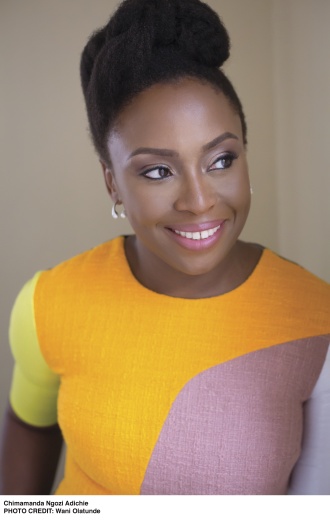
# Category: Fiction - Literary
# Format: Hardcover, 448 pages
# On Sale: September 12, 2006
# Price: $24.95 (U.S.)
# Format: Hardcover, 448 pages
# On Sale: September 12, 2006
# Price: $24.95 (U.S.)
At first glance one might imagine that "Half of a Yellow Sun" (HOAYS), Chimamanda Adichie's second book, is the story of the Nigeria-Biafra war, but really, although the war takes up a huge chunk of the book, it is more the story of a group of Nigerian people and their lives before and during the secession of Biafra. The story is told through the lives of three main characters: Ogwa, the 13-year old servant boy of a revolutionary college lecturer; Richard, an Englishman and a Biafra sympathiser, in Nigeria to study the Igbo people and who falls in love with an Igbo girl and Olanna, daughter of a rich industrialist who gives up a very pampered life to help her revolutionary lover in the fight for Biafara. Ms. Adichie, I believe, very deliberately chose this mix of characters from different stratas of Nigerian society because she wanted to explore the war from the point of view of different classes.
A little about the war:
Nigeria won their independence in 1960, but after claims of fraud, there was a military coup in 1966 mostly organized by the people from South-East Nigeria or the Igbo clan. The Igbos were were thought to have promoted many of their own in the Army at the expense of Yoruba and Hausa officers. Ethnic tensions resulted in the Northerners executing a
counter-coup six months later which led to the large-scale massacres of Christian
Igbos living in the Muslim north, which in turn led to theIgbo people demanding to secede Nigeria to live in Biafra.
Nigeria won their independence in 1960, but after claims of fraud, there was a military coup in 1966 mostly organized by the people from South-East Nigeria or the Igbo clan. The Igbos were were thought to have promoted many of their own in the Army at the expense of Yoruba and Hausa officers. Ethnic tensions resulted in the Northerners executing a
counter-coup six months later which led to the large-scale massacres of Christian
Igbos living in the Muslim north, which in turn led to theIgbo people demanding to secede Nigeria to live in Biafra.
Adichie tells the story of the Igbo ("Jews of Africa") people with candor, compassion amd impressive research. I used the word candor to describe her writing because she doesn't soften the realities of the war in order to make it more palatable for her readers. Some of the events described are so graphic, it made me cringe and I had to close the book for a few moments, just to be able to get away from those awful scenes, but, on the whole the narrative is engaging, rich in detail and flows along so smoothly you'll be turning the pages quicker than a bill counter. I especially like how she steeps much of the narrative in the local Igbo dialect - it adds so much to the authenticity of the read. Also, her descriptions of Nigeria, the landscape, culture and the people are so vivid, it creates much curiosity on the part of the reader to knowNigeria better.
 |
This book is not just for lovers of history or for people who enjoy reading about Africa - its universal lessons of survival, courage, betrayal, infedilty,forgiveness and power make for powerful reading and will leave the reader so much richer.
In closing this is one of those books that engaged me so much I will always be a little envious of anyone about to embark on this wonderful read. Sure, I could read it for the second time, but I am not sure it could have the same magic, wonder and power of the first read.
 |

10 comments:
i'll be sure to read it if you loved it that much. it's on my list!
I've got this book staring at me from my 'books to read' pile. I will read your review again properly once I've read the book!
Nomadica,
I'm so curious as to what made you pick "Half of a Yellow Sun" to read - is it the author? the subject? A recommendation? I'd love to chat with you more about it after you've read it.
Do you think those who are not so into historical pieces will still like it?
Hello be_zen8 and thanks for stopping by. A resounding YES to your question...you don't have to be a history buff to enjoy this wonderful tale of human endurance. Just to take a passage from my review ( I hate calling it a review, but just for a lack of a better word ...)
This book is not just for lovers of history or for people who enjoy reading about Africa - its universal lessons of survival, courage, betrayal, infedilty,forgiveness and power make for powerful reading and will leave the reader so much richer.
If you do read it, I hope you enjoy it!
I enjoyed this book so much that I'm actually googling it after I've read it. Thats how I ended up here. I'll be sure to look around your blog a bit more.
SHE IS GOOD.AT FIRST I DREADED READING IT THINKING IT WAS ABOUT WAR BUT BOY !CHIMAMANDA IS GOOD.I HAVE NOT READ SUCH A GOOD BOOK IN DECADES.AND ...ISNT THAT ODENIGBO SO SEXY?HE IS SO GOOD IN BED AND I HAVE A FEELING HE IS THE ONE WHO HAS BEEN TAKING THE HERB FOR MEN?
ISN'T ODENIGBO SO SEEEEEEXXXXY?AND POOR RICHARD....
hi -
came across your blog. I noticed it's quite an old entry, but just a correction: it's Half the Yellow Sun that won the Orange Prize, not Purple Hibiscus.
Lucca, thank you so much for pointing that out...I had meant to type that "Purple Hibiscus" was shortlisted for the Orange Prize...will correct that right away, thank you!
Post a Comment